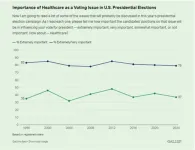(Press-News.org) University of Pittsburgh scientists independently validated a new blood test platform that can simultaneously measure more than a hundred biomarkers of Alzheimer's disease. The platform might improve clinicians’ ability to capture the multifaceted nature of Alzheimer’s pathology and streamline early disease diagnostics. The report was published in Molecular Neurodegeneration today.
“Alzheimer’s disease should not be looked at through one single lens,” said senior author Thomas Karikari, Ph.D., M.Sc., assistant professor of psychiatry at Pitt. “Capturing aspects of Alzheimer’s pathology in a panel of clinically validated biomarkers would increase the likelihood of stopping the disease before any cognitive symptoms emerge.”
Early detection of pathological changes associated with Alzheimer's disease, including signs of neuroinflammation and dysfunction in brain blood vessel function and nerve cell communication, is key to improving effectiveness of newly developed infusion treatments and to stopping or slowing down disease progression.
Capturing a detailed snapshot of molecular changes in the brains of individuals at risk of Alzheimer’s disease who are not yet experiencing any cognitive or memory changes would allow scientists to track disease progression over time and, eventually, develop guidelines for early intervention.
However, the current system for diagnosing Alzheimer’s disease is imperfect – it is resource-intensive and time-consuming for both physicians and lab technicians and can be burdensome for patients who must repeatedly undergo invasive medical procedures.
For a proof-of-concept study, Karikari and his team tested blood samples from a cohort of 113 cognitively normal older adults living in an economically underserved region in Southwestern Pennsylvania.
All samples were sent for analysis to Alamar Biosciences, the manufacturer of a new blood biomarker analysis panel called “NULISAseq CNS Disease 120 Panel.” In addition to measuring classical Alzheimer's blood biomarkers, including phosphorylated forms of tau, amyloid beta, neuroinflammation marker GFAP and nerve cell damage marker NEFL, the panel captures changes in about 120 other proteins related to neurodegenerative diseases.
The performance of the NULISA platform was independently validated against a series of assays of classical Alzheimer’s biomarkers for each individual sample. Changes in biomarker profiles over two years were also compared with imaging-based measures of amyloid, tau and neurodegeneration.
According to Karikari’s assessment, the NULISAseq panel detected several biomarkers that correlated with patients’ amyloid positivity status and changes in amyloid burden over time. Those biomarkers were all previously linked to Alzheimer’s disease but most only when measured in the cerebrospinal fluid and included proteins associated with neuroinflammation, pathological changes in brain vasculature and impaired communication between nerve cells.
Karikari hopes that the platform could be used as a tool to keep track of blood biomarker changes over time in individuals who are asymptomatic and those who are already receiving treatment. His lab is developing a predictive model that correlates biomarker changes detected with NULISAseq with brain autopsy data and cognitive assessments collected over the course of several years. Their goal is to identify blood biomarkers that can help stage the disease and predict disease progression, both used for decision-making around clinical management and treatment plans.
Other authors of the research are Xuemei Zeng, Ph.D., Tara Lafferty, M.S., Anuradha Sehrawat, Ph.D., Yijun Chen, M.S., Pamela Ferreira, Ph.D., Bruna Bellaver, Ph.D., Guilherme Povala, Ph.D., M. Ilyas Kamboh, Ph.D., William Klunk, M.D., Ph.D., Ann Cohen, Ph.D., Oscar Lopez, M.D., Milos Ikonomovic, M.D., Tharick Pascoal, M.D., Ph.D., Mary Ganguli, M.D., M.P.H., Victor Villemagne, M.D., and Beth Snitz, Ph.D., all of Pitt.
This research was supported by the National Institute on Aging (grants R01 AG083874, R37 AG023651 and R01 AG052521).
END
Pitt scientists validate new lab test platform for blood biomarkers of Alzheimer's disease
2024-10-10
ELSE PRESS RELEASES FROM THIS DATE:
No bolts about it: New technology improves structural strength
2024-10-09
In a collaborative effort between Texas A&M University and Sandia National Laboratories, researchers have significantly improved a new joining technology, interlocking metasurfaces (ILMs), designed to increase the strength and stability of a structure in comparison to traditional techniques like bolts and adhesives, using shape memory alloys (SMAs). ILMs offer the potential to transform mechanical joint design in manufacturing for aerospace, robotics and biomedical devices.
“ILMs are poised to redefine joining technologies ...
Medical professionals must lead the fight against climate misinformation
2024-10-09
Medical professionals have a responsibility to lead the fight against climate misinformation to ensure that the public is well informed about the health risks posed by climate change, say experts in The BMJ today.
Misinformation (inaccurate information spread without malicious intent) and disinformation (deliberately deceptive information) in health is not new, write Professor Andy Haines and colleagues.
Just as the rapid spread of false information during the covid-19 pandemic undermined public trust in science and public health interventions, false information also pervades the climate change debate, influencing public perception and ...
Should doctors be suspended for unlawful climate activism?
2024-10-09
Former GP Sarah Benn was suspended by the medical practitioners tribunal service (MPTS) after an arrest for her involvement in climate protests. In The BMJ today, two experts debate the question of when and whether doctors in such cases should be sanctioned.
The recent case of Sarah Benn has sparked debate, partly because of a perception that the GMC referred her to a MPTS tribunal for taking part in peaceful protests, says Andrew Hoyle, assistant director at the GMC.
In reality, he explains ...
Extreme rainfall linked to heightened risk of death
2024-10-09
Extreme rainfall events are associated with an increased risk of death from all causes as well as from heart and lung diseases, finds an analysis of data from 34 countries and regions published by The BMJ today.
The health effects of extreme rainfall varied by local climate and vegetation coverage, providing a global perspective on the effect of extreme rainfall events on health.
Climate change is intensifying the frequency and severity of short term rainfall events, and emerging evidence suggests a compelling link between rainfall events and adverse health outcomes, particularly transmission ...
New research highlights the overlooked dangers of subtle and covert abuse in intimate relationships
2024-10-09
Peer-reviewed – Scoping Review - People
New research from the University of East Anglia has uncovered a significant gap in understanding of a harmful form of domestic abuse known as subtle or covert abuse.
Unlike more obvious forms of physical or verbal abuse, subtle abuse is less visible but can be just as damaging to victims.
The review found that current research on this topic is limited, despite its potentially widespread impact.
The findings suggest that subtle abuse ...
Snowflake dance analysis could improve rain forecasts
2024-10-09
The key to more accurate rainfall predictions may lie in the intricate dance of falling snowflakes, a new study has found.
The research, observing the physical motion of falling ice crystals, will help scientists better estimate where and when these crystals will melt into raindrops, a crucial stage in the formation of many types of rain.
Published today (Thursday 10 October) in the journal Atmospheric Chemistry and Physics, the study involved scientists watching how fake snowflakes fell in a substance ...
ASPB welcomes Hong Ma as Society President
2024-10-09
ASPB is delighted to welcome its new President, Hong Ma, who was elected in 2023 as President-elect and served in this role starting October 1, 2023. He stepped into his role as ASPB President on October 1, 2024 following the end of now-Past President Leeann Thornton’s term.
“A top priority is to support and train young plant biologists toward becoming members of a community with greater diversity, to amplify the voices of diverse members of our society, and to promote diversity and representation in society leadership and society activities,” ...
Can advanced AI can solve visual puzzles and perform abstract reasoning?
2024-10-09
Artificial Intelligence has learned to master language, generate art, and even beat grandmasters at chess. But can it crack the code of abstract reasoning—those tricky visual puzzles that leave humans scratching their heads? Researchers at USC Viterbi School of Engineering Information Sciences Institute (ISI) are putting AI’s cognitive abilities to the test, pushing the multi-modal large language models (MLLMs) to solve visual problems once reserved for human IQ tests. The result? A glimpse into how far AI has come—and where it still stumbles.
USC Viterbi ISI Research ...
West Health-Gallup poll: Healthcare may be sleeper issue in U.S. presidential campaign
2024-10-09
WASHINGTON, D.C. – Oct. 9, 2024 – Though in this year’s presidential election healthcare has seemingly taken a back to other issues including the economy and democracy, nearly eight in 10 registered voters still say the issue that has been critical in nearly every presidential campaign in modern history, remains extremely (37%) or very important (42%) to whom they cast their vote, according to a new a West Health-Gallup poll of voters. This sentiment is consistent with what’s been expressed in most previous elections, although slightly more ...
UC Irvine scientists track and analyze lofted embers that cause spot fires
2024-10-09
Irvine, Calif., Oct. 9, 2024 — In the chaos of a wildfire, heat, wind, flames and fuel interact to produce embers that are lofted into surrounding areas, starting new spot fires and spreading destruction and property loss in California’s wildland-urban interface. Researchers at the University of California, Irvine have conducted first-of-their-kind field experiments to better understand the physics of these firebrands, and their results can help authorities better model the outcomes of disasters that are happening with greater frequency in a warming climate.
In a paper published recently in the journal Physics of Fluids, UC Irvine team members describe their ...






